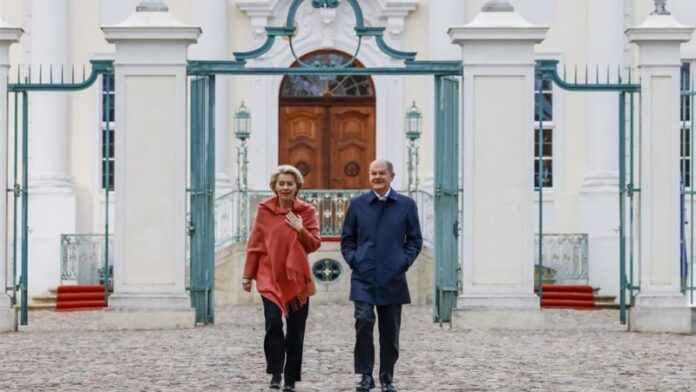German Chancellor Olaf Scholz said talks were constructive with the European Union in resolving a dispute over plans to ban new combustion-engine cars in the bloc from 2035, after Berlin derailed the effort this past week, according to Bloomberg.
Scholz met with European Commission President Ursula von der Leyen on the sidelines of a government retreat in Meseberg north of Berlin on Sunday. The chancellor expressed optimism a deal could be reached and said discussions would continue in the coming days.
Germany has put pressure on the Commission, the EU’s executive arm, to come forward with a proposal that would allow combustion cars running exclusively on so-called e-fuels to continue to be sold after cut-off date.
A final vote on the issue was due to take place on March 7 but was indefinitely delayed amid fears that Germany could abstain, which would torpedo the regulation.
“We are in a constructive dialogue,” von der Leyen told reporters after the meeting. “We give full support for technological openness, but it must be in line with our goal of climate change.” She added that the discussions were “good and constructive.”
Decarbonizing transport is seen as a key pillar of the EU’s goal to cut emissions by 55% this decade on the way to climate neutrality by 2050. But cars hold outsize importance in Germany, where the auto industry employs about 800,000 people and has revenue of about €411 billion, making it the largest segment of the economy by far.
Scholz said that the issue is what can be achieved regarding the outlook for vehicles that exclusively use e-fuels after 2035. “It’s not at all about differences of opinion but about the question of how it can work,” he said. “And that is such a solvable question that we’re all very optimistic — not just within the German government but also regarding our talks with the Commission.”
The FDP, the junior partner in Scholz’s three-party alliance, has been the driving force behind opposition to the combustion engine ban. FDP officials including Transport Minister Volker Wissing have been trying to raise the party’s profile in the government in recent months and he called on the commission to come up with a viable solution, such as making combustion engines that run on synthetic fuels exempt from the ban.
“The internal combustion engine itself is not the problem, the fossil fuels it runs on are,” Wissing said Sunday in a tweet. “Climate neutrality is the goal and at the same time an opportunity for new technologies,” he added. “To achieve this, we have to be open to different solutions.”
Proponents of e-fuels say they’re essentially renewable electricity that’s been converted into a combustible, liquid fuel.
To make it, captured carbon dioxide is combined with hydrogen split from water in a process powered by renewable energy, creating a synthetic hydrocarbon fuel. When burned in a combustion engine, the e-fuels create carbon dioxide. But since it was made from previously captured CO2, backers argue it’s climate neutral.
Opponents say e-fuels are a waste of renewable energy and should be saved for harder-to-decarbonize uses. There are also concerns in the industry itself that an e-fuel exception — even if limited to some sports cars — could blunt the impact of a clear 2035 ban on combustion engines.
The EU has been struggling to come up with assurances that would assuage the FDP, but is constrained by a tight time line ahead of EU elections next year. The bloc is due to review the regulation by 2026, but that is understood to be too far off for government in Berlin.
While German officials have signaled willingness to compromise, the issue has nonetheless raised fears over potential objections to other parts of the EU’s ambitious climate agenda.
The vote on carbon rules in cars this week was supposed to be a formality after a deal was struck between the bloc’s 27 member states and parliament in October.


